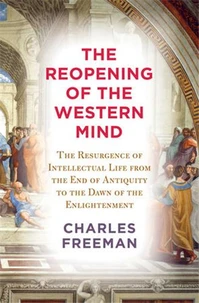The conversion of the emperor Constantine to Christianity in 368 AD brought a transformation to Christianity and to western civilization, the effects of which we still feel today. Previously, the Roman empire had absorbed and sustained the Greek intellectual tradition which, in the astronomy of Ptolemy, the medicine of Galen and the philosophy of Plotinus, reached new heights. Constantine turned Rome from the relatively open, tolerant and pluralistic civilisation of the Hellenistic world, towards a culture that was based on the rule of fixed authority.
The century after Constantine's conversion saw the development of an alliance between church and state which stifled freedom of thought and the tradition of Greek rationalism which was intrinsic to it. The churches enjoyed enormous patronage and exemptions from tax, and in return allowed the emperors to take on the definition and enforcement of an increasingly narrow religious orthodoxy. This book explores how the European mind was closed by the revolution of the fourth century.
It looks at the rise of the 'divine' monarch, the struggle as Christianity painfully separated itself from Judaism, the conflict between faith and reason, and the problems in finding any kind of rational basis for Christian theology. In these centuries, a turning-point for Western civilisation, we see the development of Christian anti-Semitism, the origins of the opposition of religion and science and the roots of Christianity's discomfort with sex, issues which haunt the Christian churches to this day.
The Closing of the Western Mind is a major work of history. Wide-ranging and ambitious, its central theme is the relationship between the two wellsprings of our civilisation, the Judaeo-Christian and the Greco-Roman, and how the tensions between them have created the culture in which we continue to live, think and believe.
The conversion of the emperor Constantine to Christianity in 368 AD brought a transformation to Christianity and to western civilization, the effects of which we still feel today. Previously, the Roman empire had absorbed and sustained the Greek intellectual tradition which, in the astronomy of Ptolemy, the medicine of Galen and the philosophy of Plotinus, reached new heights. Constantine turned Rome from the relatively open, tolerant and pluralistic civilisation of the Hellenistic world, towards a culture that was based on the rule of fixed authority.
The century after Constantine's conversion saw the development of an alliance between church and state which stifled freedom of thought and the tradition of Greek rationalism which was intrinsic to it. The churches enjoyed enormous patronage and exemptions from tax, and in return allowed the emperors to take on the definition and enforcement of an increasingly narrow religious orthodoxy. This book explores how the European mind was closed by the revolution of the fourth century.
It looks at the rise of the 'divine' monarch, the struggle as Christianity painfully separated itself from Judaism, the conflict between faith and reason, and the problems in finding any kind of rational basis for Christian theology. In these centuries, a turning-point for Western civilisation, we see the development of Christian anti-Semitism, the origins of the opposition of religion and science and the roots of Christianity's discomfort with sex, issues which haunt the Christian churches to this day.
The Closing of the Western Mind is a major work of history. Wide-ranging and ambitious, its central theme is the relationship between the two wellsprings of our civilisation, the Judaeo-Christian and the Greco-Roman, and how the tensions between them have created the culture in which we continue to live, think and believe.

 , qui est-ce ?
, qui est-ce ?